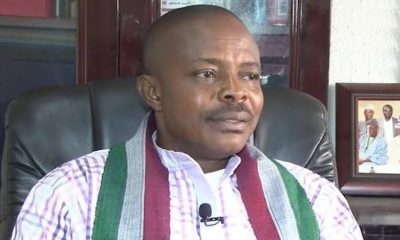News
Minimum wage: We accepted N70K in place of an increase on fuel price-Ajaero reveals

President of the Nigeria Labour Congress, NLC, Comrade Joe Ajaero, on Friday, said that during the meeting on the new Minimum wage with President Bola Tinubu at the Presidential Villa, the organised labour turned down the offer of an increase in petrol pump price to accept N70,000 as the new minimum wage.
Recall that the organised labour comprising the Nigeria Labour Congress and the Trade Union Congress, had insisted on N250,000 as the new minimum wage but later settled for the offer of N70,000 from the President.
Fielding questions during the Morning Show on Arise News on whether the President betrayed the trust of the NLC in the negotiations by increasing the petrol pump price despite the alleged ‘agreement’ with him, the NLC President said:
“I have to narrate the scenario to you, and then we now choose the appropriate word, whether betrayed, deceived or whatever.
” While we were discussing because we stalemated at 62,000 Naira, even the states were saying they won’t pay, so there was a stalemate that took us to Mr. President.
“And we insisted on 250 (Thousand Naira) and Mr President at the meeting, turned to me and said, Ajaero, you are the person holding my hand from increasing further.
“I said increase what? He said, since I said subsidy is gone, we should have gotten the appropriate price. We should have increased. I want to sponsor you people, labour, to travel to these West African countries and know how much they are paying.
“Some are paying 2,000 (Naira), 1,800 (Naira), 1700 (Naira). As he announced it, we declined immediately that we are not going to take that sponsorship.
“He said, okay, I will go to my office for one hour. You guys decide if you agree for me to increase, I will pay you 250 (Thousand Naira), if not, you take this 62 (Thousand Naira). He stood up and we said, Mr. President, no, we can’t sit down here to decide in your office, we will take about one week to go back and discuss and get back to you, which was exactly what happened, ask anybody, and we adjourned for one week.
“He said, oh, I’m supposed to travel, but because of you, I will cancel my trip until after one week, and when we, reconvened, we were clear to Mr. President that we didn’t have any mandate to come here to discuss a price of a petroleum product or increase, we’re only here to discuss minimum wage and minimum wage alone we’re going to discuss. And we agreed on the basis of that we accepted 70,000 (Naira).
Ajaero also said that the organs of the NLC will meet next week to discuss the new pump price increase, adding that no single person in the labour movement can take a decision without the involvement of all the organs.
On why he has not declared a strike after the new price hike, the NLC President said, “No NLC President will come out and say, we are going to start strike tomorrow or next tomorrow without the organs meeting. In instances, either the CWC (Central Working Committee) or the NEC (National Executive Council), so we are following that process.”
Asked whether the Congress has started consultations in-house on that, he said, “By latest next week we should be able to meet and have a conversation around this so that the personal view of the leader (NLC President), does not becloud the position of the of the members.”
News
Just in: Popular Nigerian billionaire, E-Money nabbed by EFCC

Naijablitznews reports that popular billionaire Emeka Daniel Okonkwo otherwise known as E-Money has been nabbed in Lagos by the Economic and Financial Crimes Commission, EFCC over alleged Naira abuse.
E-Money, who is the CEO of Emmy Cargoes Nigeria Limited and Five Star Music, was arrested in Lagos State for alleged abuse of the naira.
He is being investigated for allegedly spraying both Naira and US dollars at a party in Lagos in violation of Nigeria’s currency laws.
As at the time of filing this report the anti-graft agency has yet to issue an official statement regarding his arrest.
News
Bitcoin firms push toward global currency shift as govts signal support

By Francesca Hangeior
Bitcoin-focused investment firms are stepping into the spotlight as key players in a growing global movement toward the widespread adoption of cryptocurrency as a reserve asset.
Industry leaders and market analysts suggest that this shift—commonly referred to as “hyperbitcoinization”—could eventually displace traditional fiat currencies and redefine global financial systems.
Adam Back, CEO of Blockstream and the inventor of Hashcash, believes that firms holding Bitcoin in their treasuries are strategically positioning themselves ahead of this potential transformation. “
Companies like Strategy are taking advantage of the gap between Bitcoin’s future potential and the current state of fiat money,” Back said.
He described the practice as a “logical and sustainable arbitrage” scalable enough to support large corporations transitioning their treasuries to Bitcoin.
One of the frontrunners in this strategy is Strategy, whose Bitcoin holdings have already generated over $5.1 billion in profit since the beginning of 2025, according to co-founder Michael Saylor.
The firm’s bullish stance on Bitcoin has been instrumental in legitimizing corporate treasury allocations into digital assets.
Across the globe, Asia is also seeing a surge in institutional Bitcoin adoption. Metaplanet, often referred to as “Asia’s MicroStrategy,” recently surpassed 5,000 BTC in holdings and aims to acquire 21,000 BTC by 2026.
These moves illustrate the expanding geographical spread of institutional confidence in Bitcoin’s long-term viability.
At the regulatory level, the climate in the United States is becoming more favorable. The Federal Reserve recently reversed its 2022 guidance that had discouraged banks from engaging with cryptocurrencies. Michael Saylor welcomed the development, stating that U.S. banks “can now begin openly supporting Bitcoin without regulatory concerns.”
In an even more significant move, President Donald Trump signed an executive order to create a national Bitcoin reserve using BTC seized in criminal investigations. The initiative marks a historic moment in the relationship between government and cryptocurrency, signaling a new era of state-backed digital asset reserves.
Bitcoin’s price growth is also outpacing inflation rates, bolstering the argument for its superiority over fiat currencies.
“Bitcoin’s price has been growing faster than traditional fiat currencies over four-year periods,” Back noted, emphasizing Bitcoin’s fixed supply and inflation resistance as core attributes driving its adoption.
As investment firms, multinational corporations, and now governments increasingly turn to Bitcoin, momentum is building for a future where Bitcoin could serve as a dominant global reserve currency.
With market experts projecting Bitcoin’s market cap could one day exceed $200 trillion, the financial world may be on the cusp of a historic transformation.
News
Human rights attacks accelerated by Trump second term, says Amnesty

By Francesca Hangeior
The global system of law and human rights is under threat from a “multiplicity of assaults” which have accelerated since US President Donald Trump’s return to power, Amnesty International said Tuesday in its annual report.
“Unprecedented forces are hunting down the ideals of human rights for all, seeking to destroy an international system forged in the blood and grief of World War Two and its Holocaust,” said the rights group’s Secretary General Agnes Callamard.
The lives of millions of people had been “devastated” in 2024 as a result of conflicts and abuses committed in the Middle East, Sudan, Ukraine and Afghanistan where women’s freedoms continue to be curtailed.
The report singled out some of the world’s biggest powers such as the US, Russia and China for “undermining” the achievements of international law, as well as the fight against poverty and discrimination.
While these “reckless and punishing offensives” had been underway for several years, according to Amnesty, Trump had served as a “super-accelerator” of those trends.
The new administration has frozen US international aid and reduced its funding to several UN organisations.
The start of Trump’s second term had been marked by a “multiplicity of assaults — against human rights accountability, against international law, and against the UN”, Callamard said, calling for “concerted resistance”.
“While international justice mechanisms have taken important steps towards accountability in some cases, powerful governments have repeatedly blocked attempts to take meaningful action to end atrocities,” Amnesty said.
In particular, it took aim at countries that had challenged decisions by the International Court of Justice in The Hague against Israel, following a complaint of “genocide” against the Palestinians in Gaza filed by South Africa.
Others, like Hungary, were criticised for refusing to enforce arrest warrants issued by the International Criminal Court against several Israeli leaders, including Prime Minister Benjamin Netanyahu, for war crimes and crimes against humanity.
The year would be remembered for how “Israel’s military occupation grew ever more brazen and deadly” and how “the USA, Germany and a handful of other European states supported Israel”, the report added.
Amnesty accused Israel of committing a “live-streamed genocide” against Palestinians in Gaza by forcibly displacing most of the population and deliberately creating a humanitarian catastrophe.
It said Israel had acted with “specific intent to destroy Palestinians in Gaza, thus committing genocide”. Israel has repeatedly denied such charges.
The war in Gaza began on October 7, 2023 with an unprecedented attack on Israel by Hamas militants from Gaza resulting in the deaths of 1,218 people in Israel, mostly civilians, according to an AFP report based on official Israeli data.
Hamas also kidnapped 251 people, 58 of whom remain in the hands of the Islamist group, although the Israeli military says 34 are dead.
In response, Israel has vowed to destroy Hamas and is conducting a military offensive that has left more than 52,000 dead, mostly civilians, according to the health ministry in the Hamas-run territory.
In December, Amnesty condemned the ongoing “genocide” in Gaza, an accusation since echoed by other NGOs such as HRW and Doctors Without Borders, but strongly rejected by Israel.
Amnesty also highlighted the suffering in Sudan from famine and a conflict between the regular army and the RSF paramilitaries.
The conflict had led to the “largest forced displacement crisis in the world” today, uprooting some 12 million people but had been met with “near-complete global indifference”, Amnesty said.
On another front, the rights body said violence and discrimination against women had “soared” in 2024, both in conflicts, such as in Sudan, and in Afghanistan.
Women in the south Asian country are subject to draconian legislation restricting their freedoms under the Taliban.
Finally, the report highlighted an “urgent need” for governments to do more to regulate AI technologies to safeguard human rights.
It warned also that a growing number of governments were abusing spyware and other surveillance tools against opponents.
-

 News9 hours ago
News9 hours agoCourt dismisses Emefiele’s bid to reclaim forfeited 753 duplex estate
-

 News23 hours ago
News23 hours agoBreaking: Late gospel singer Osinachi’s husband sentenced to death by hanging
-

 Metro9 hours ago
Metro9 hours agoWanted CBEX promoter surrenders to EFCC
-

 Opinion5 hours ago
Opinion5 hours agoTHOUGHTS ON CONSTITUENTS DEVELOPMENT IN OBIO-AKPOR
-

 News23 hours ago
News23 hours agoVatican: Conclave to elect a new pope will start on May 7
-

 Politics9 hours ago
Politics9 hours agoPDP Calls Emergency Session as Top Members Flee to APC
-

 Education21 hours ago
Education21 hours agoWAEC, NECO set to begin computer-based exams in 2026
-

 News23 hours ago
News23 hours agoSultan declares Tuesday first day of Zulki’ida 1446AH












